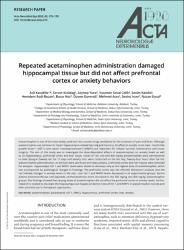Repeated acetaminophen administration damaged hippocampal tissue but did not affect prefrontal cortex or anxiety behaviors

View/
Access
info:eu-repo/semantics/openAccessDate
2022Author
Karakılıç, AslıKızıldağ, Servet
Yüce, Zeynep
Çelik, Yasemin Seval
Kandiş, Sevim
Bozan, Hemdem Rodi
Koç, Başar
Metadata
Show full item recordAbstract
Acetaminophen is one of the most widely used over-the-counter drugs worldwide for the treatment of pain and fever. Although acetaminophen use is known to impair hippocampus-related learning and memory, its effect on anxiety is not clear. Insulin-like growth factor-1 (IGF-1) and matrix metalloproteinase-2 (MMP2) are important for cellular survival, maintenance and tissue integrity. The aim of this study was to investigate the dose-dependent effects of acetaminophen on anxiety levels as well as on hippocampus, prefrontal cortex and liver tissue. Doses of 100, 200 and 400 mg/kg acetaminophen were administered to male Sprague Dawley rats for 11 days and anxiety tests were conducted on the last day. Twenty-four hours after the last acetaminophen administration, all animals were sacrificed and hippocampus, prefrontal cortex and liver tissues were removed for analyses. Hippocampal IGF-1 and MMP2 levels were shown to decrease only at the highest dose of acetaminophen, which was accompanied by pathological changes in histology. The prefrontal cortex was not affected. Behavioral analyses also did not indicate changes in anxiety levels in the rats. Liver IGF-1 and MMP2 levels decreased in all experimental groups. Serum alanine aminotransferase and aspartate aminotransferase levels increased in the 200 mg/kg and 400 mg/kg acetaminophen groups. Our findings showed that varying doses of acetaminophen did not affect the prefrontal cortex or anxiety levels. Further research is needed to elucidate the hippocampal and hepatic protective roles of IGF-1 and MMP2 in acetaminophen toxicity and their potential use in therapeutic approaches.

















